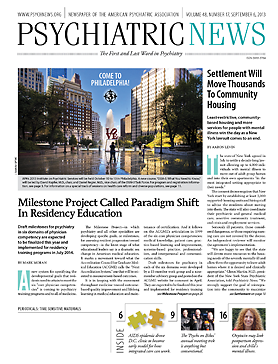A new system for specifying the developmental goals that residents need to attain to meet the six “core physician competencies” is coming to psychiatry training programs and to all of medicine.
The Milestone Project—in which psychiatry and all other specialties are developing specific goals, or milestones, for assessing resident progression toward competency—is the latest stage of what educational leaders say is a dramatic sea change in American medical education. It marks a movement toward what the Accreditation Council for Graduate Medical Education (ACGME) calls the “Next Accreditation System,” one that will be oriented to measurement-based outcomes.
It is in keeping with the movement throughout medicine toward outcome-based quality improvement and lifelong learning in medical education and maintenance of certification. And it follows on the ACGME’s articulation in 1999 of the six core physician competencies: medical knowledge, patient care, practice-based learning and improvement, systems-based practice, professionalism, and interpersonal and communication skills.
Draft milestones for psychiatry in each of the six domains were developed by a 15-member work group and a nine-member advisory group and posted on the ACGME website for comment in April. They are expected to be finalized this year and implemented for residency training programs in July 2014. (For an overview of the structure of milestones and some specific examples, see sidebar).
Christopher Thomas, M.D., chair of the Psychiatry Milestone Group, said the project moves the training of residents away from a longstanding model that simply described in broad terms the kind of experience a trainee should have doing a particular rotation, to one that delineates specific descriptors and targets for resident performance as the resident moves from entry into residency through graduation.
“By using the milestones, we can provide better, more specific, and targeted markers for program directors in terms of being able to document that a resident has achieved certain skills,” he told Psychiatric News. “It will allow us to give better feedback to residents and say, ‘You have demonstrated you can do this; now here are the things you need to learn in order to move forward.’
“It is really a major paradigm shift in how we approach resident education,” continued Thomas, who is assistant dean for graduate medical education and director of the child psychiatry residency program at the University of Texas Medical Branch at Galveston.
In an article in the March 15, 2012, New England Journal of Medicine, ACGME Chair Thomas Nasca, M.D., explained that the milestones are a way of codifying the six competencies in concrete ways meaningful to the actual clinical practice of a specialty. “At the completion of training, the final milestones will provide meaningful data on the performance that graduates must achieve before entering unsupervised practice,” Nasca wrote. “This process moves the competencies out of the realm of the abstract and grounds them in a way that makes them meaningful to both learners and faculty. The final milestones also create the entry point into the maintenance of certification and licensure phase of lifelong learning. The initial milestones for entering residents will add a performance-based vocabulary to conversations with medical schools about graduates’ preparedness for supervised practice. Over time, the milestones will reach into undergraduate medical education to follow the adoption of the competencies by many medical schools. This will contribute to a more seamless transition across the medical-education continuum.”
APA has served in an advisory capacity in the development of the milestones for psychiatry—Deborah Hales, M.D., director of the APA Office of Education, and Richard Summers, M.D., chair of APA’s Council on Medical Education and Lifelong Learning, serve on the seven-member advisory group.
Thomas told Psychiatric News that educators have been largely upbeat about the milestones endeavor. There have been concerns about the how much administrative overhead it may place on already burdened training programs. And because the project entails programs doing business in a dramatically new way, there is a degree of uneasiness about the unknown.
But Thomas noted that in two surveys of the field—one by ACGME and one by the American Association of Directors of Psychiatric Residency Training—responses to the project have been generally positive. “I’ve been gratified by the support for this project,” he said “We feel we are on the right track.”
Summers, too, expressed a sense of anticipation that the milestones may help to transform resident education in positive ways. “This is an exciting national experiment to see if by defining outcome measures and assessing our residents against those outcomes, we can demonstrably improve resident education,” Summers said. “It sets up a structure for each residency program to be much more focused in evaluating how well it is doing.”
He said the project has also allowed educators to think about the areas in which residency education in psychiatry needs to expand and pointed out these two specific areas: the ability of psychiatrists to work within systems of care and the application of clinical neuroscience in a patient-care setting.
So, for instance, under the competency domain of “Medical Knowledge,” the psychiatry milestones delineate milestones for “Clinical Neuroscience, including knowledge of neurology, neuropsychiatry, neurodiagnostic testing, and relevant neuroscience.”
The milestones in that area for a resident who reaches Level 4 would indicate that the resident has demonstrated the ability to explain the significance of routine neuroimaging and neurophysiological and neuropsychological testing abnormalities to patients; explain neurobiological hypotheses and genetic risks of common psychiatric disorders to patients; describe psychiatric comorbidities of less-common neurologic disorders and less-common neurologic comorbidities of psychiatric disorders; and describe leading neuroscientific hypotheses of emotions and social behaviors.
“It’s unknown what the impact is going to be,” Summers said. “The upside is that there is a real potential that this will provide a framework to improve the education of residents and simplify oversight and accreditation. The concerns are that this is an experiment, and we really don’t know how it will play out.” ■
